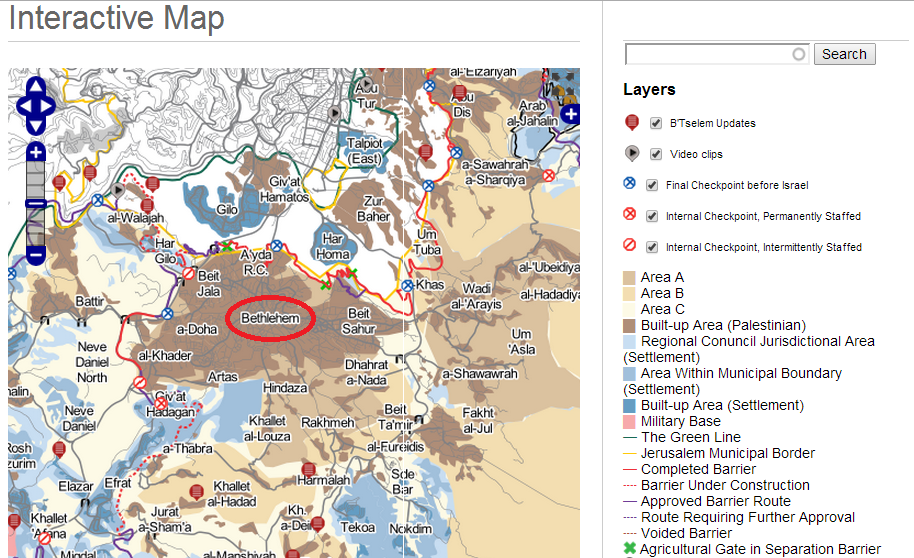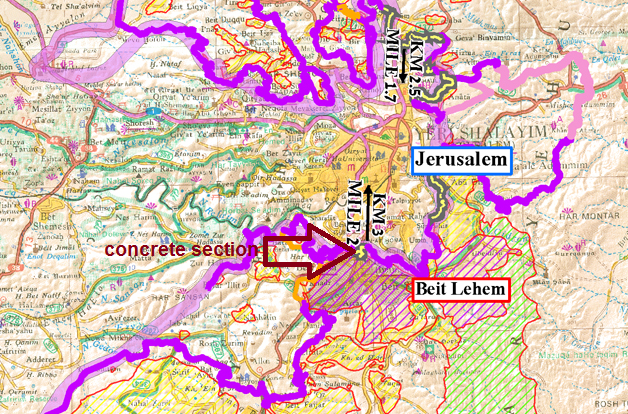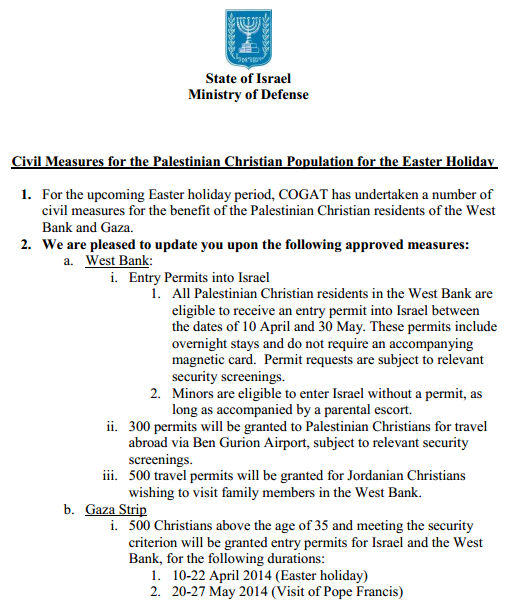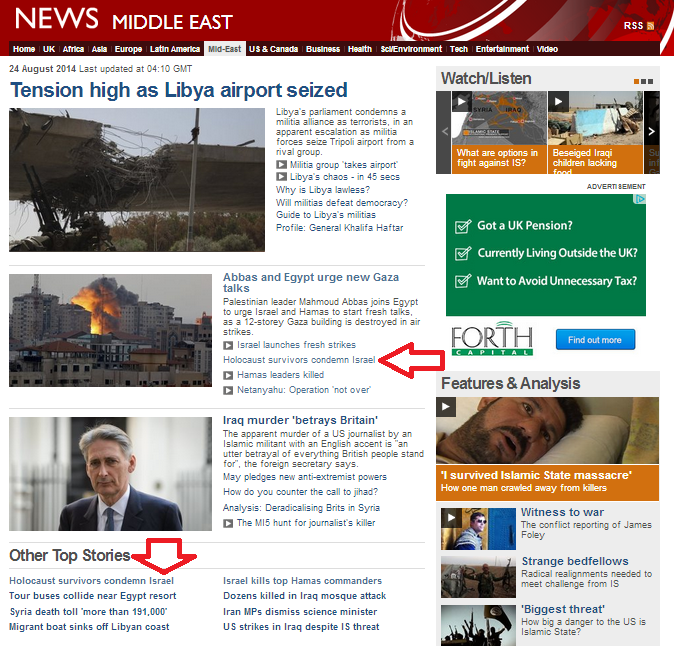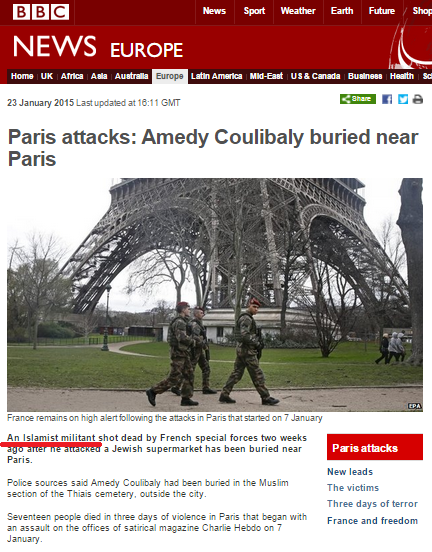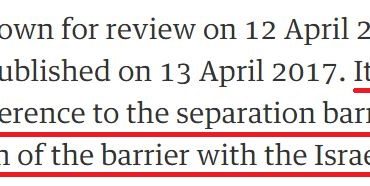Among the BBC’s remarkably extensive coverage of Pope Francis’ visit to the Middle East is an article by the Jerusalem bureau’s Yolande Knell which appeared in the ‘Features & Analysis’ section of the BBC News website’s Middle East page on May 25th under the title “Thorny issues await Pope in Holy Land“.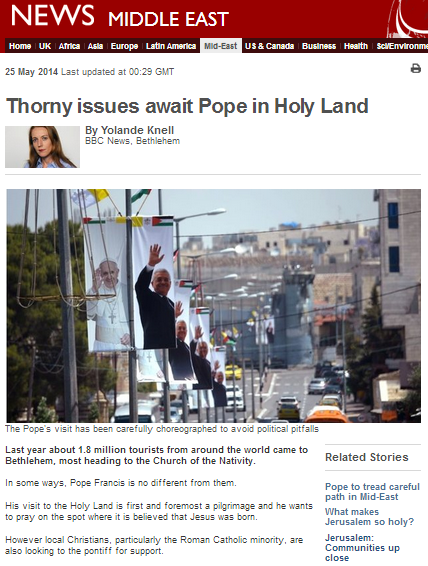
In that article, Knell uses selected quotes from Palestinian interviewees – and adds her own commentary – to produce a concentrated version of some of the prime falsehoods which the BBC has been amplifying for some time now. Notably absent from Knell’s piece is the necessary background needed for BBC audiences to put the highlighted statements in their correct context.
Her first interviewee is Rania Bandak.
“We are not able to move freely to all parts of Palestine. Bethlehem is surrounded by Jewish settlements and the high wall that cuts us off from Jerusalem.”
As has been noted here before on numerous occasions, the number of checkpoints has been reduced dramatically as counter-terrorism measures have proved effective and hence movement within Judea and Samaria has vastly improved since the days of the second Intifada which brought about the need for security checkpoints; a point not made clear to readers either by Bandak or Knell.
The false claim that “Bethlehem is surrounded by Jewish settlements” is a version of a theme also frequently seen in BBC reports – see for example here and here. The word ‘surrounded’ of course means enclosed on all sides but, as can be seen on the B’tselem-produced map below, that is not the case.
Neither is Bethlehem “surrounded” by “the high wall”. Not only is there no anti-terrorist fence to the south and east of Bethlehem, but the section which can accurately be described as a “high wall” is one small specific section. On the map below, concrete sections of the anti-terrorist fence are marked with yellow and grey stripes whilst parts made of wire fencing appear in purple and the orange section represents road protection from sniper attacks.
So already in one sentence from her first interviewee, Knell has caused BBC audiences to mistakenly believe that Palestinians are not able to travel around Judea & Samaria and that Bethlehem is encircled by “Jewish settlements” and a “high wall” – and all without even a single reference to the Palestinian terrorism which makes security measures necessary. But there is more: carrying straight on from those falsehoods, readers are fed the false implication that Israel is causing Palestinian Christians to leave the area, with Knell failing to make any reference to the issue of intra-Palestinian harassment of Christians.
” “The Pope’s message should be that he wants us to stay in this land,” adds souvenir shop owner, Rony Tabash.”
Under the loaded sub-heading “Barrier fear”, Knell goes on to promote the usual BBC formula regarding the anti-terrorist fence which ignores its proven track record of prevention of terrorism – as well as the issue of terrorism itself – instead presenting the issue to BBC audiences as one of subjective competing narratives and thus legitimizing the notion of a “land grab” which does not exist whilst erasing from the picture the terrorism which does.
“One issue that is sure to come up is the barrier that Israel is continuing to build in and around the occupied West Bank. Israel says its barrier is needed for security reasons but the Palestinians see it as a land grab.”
Next, Knell returns to one of her favourite topics – the Cremisan Valley – allowing her interviewee to falsely suggest to BBC audiences (also in the accompanying film clip) that there is some kind of connection between the Pope’s visit and the legal proceedings concerning the route of the anti-terrorist fence there and that land belonging to Palestinians from Beit Jala will no longer remain theirs if the fence is built on its proposed route.
“Israel’s Supreme Court has delayed its decision on a controversial section that runs through the Cremisan Valley in Beit Jala, where the land belongs to 58 Christian families and the Roman Catholic Church.
“This valley is very important for Beit Jala and for Christians,” says Maha Saca who joins the weekly open-air Mass in Cremisan. “It’s our land until now. And we’re afraid that after the Pope leaves Bethlehem, the Israelis will take our land through the court.” “
Under the sub-heading “We need our freedom”, Knell writes:
“Representatives from a small Christian delegation given Israeli permits to come to Bethlehem from the Gaza Strip hope to tell the Pope about the impact of border restrictions.
These were tightened by Israel and Egypt after the Islamist group, Hamas, seized control of the Palestinian territory in 2007, a year after winning elections and entering a unity government. Israel, along with other countries, views Hamas as a terrorist group.”
Predictably, Knell fails to clarify to readers that “border restrictions” are necessary measures which are part of Israel’s attempt to protect its citizens against the terror attacks emanating from the Gaza Strip – which she fails to even mention. Likewise, Knell fails to make any reference to the persecution of Christians in Gaza by Hamas and other Islamist extremists.
As was noted here recently, the Israeli Ministry of Defence provided 500 permits for members of Gaza’s 1,500 strong Christian community to travel to Israel and the PA-controlled areas during the Pope’s visit. That is one-third: hardly a “small delegation” as Knell claims.
Knell highlights a tided up quote from her next interviewee:
“Pope Francis is our hero,” says George Anton, a teacher at the Holy Family School in Gaza. “We would ask him to interfere so that we can get peace and the Palestinian state very quickly, because we need our freedom. We feel like we are in a big jail here.”
In the film clip of George Anton inserted into that part of Knell’s article, the BBC facilitates the promotion of the inaccurate notion that the Gaza Strip is under “occupation” nine years after Israel’s evacuation.
“We would ask him to interfere that they can get the peace and we can get the Palestinian state, you know, very quickly because we need our freedom, you know. We feel like we are in a big jail here in Gaza. We cannot move, you know. All the people they look to us like we are terrorists, we are criminals. It is really [unintelligible] because we are people, you know. We are Christians, we are Muslims, but we are people. We are under occupation, you know. We are the people who are suffering, you know, so we need somebody to stand by us.”
Neglecting to inform readers of the interesting fact that even the PA acknowledges that it is situated on land owned by the Jewish National Fund since before 1948, Knell then moves on to the topic of Dheishe refugee camp, inserting a passing context-free promotion of the ‘right of return’ without bothering to explain its implications and failing to clarify to readers that “the 1948 war which followed Israel’s creation” was in fact an attack on a nascent state by five Arab states, two irregular armies and an assortment of foreign volunteers – all of whom played their part in the creation of the Palestinian refugee problem.
“As Pope Francis heads out of Bethlehem, he will stop off at a community centre by the Dheisheh camp where local children will sing for him. Their families fled or were forced to leave their homes in the 1948 war which followed Israel’s creation.
While the stop-off is only short, an organiser, Abu Khalil al-Laham, says it is symbolically important to meet Palestinian refugees.
“They’ll bring up the right for refugees to return to their towns and villages and their dream to live in peace and tranquillity,” he tells me.”
The filmed accompaniment to this part of Knell’s piece facilitates yet more context-free Palestinian propaganda, failing to inform viewers that over 95% of Palestinians in Judea & Samaria live under Palestinian Authority rule.
“The children here will deliver a message, in a natural way, about how Palestinians suffer because of Israel’s occupation of the West Bank. They’ll bring up the right for refugees to return to their towns and villages and their dream to live – like other people in the world – in peace and tranquility.”
Knell rounds off her article with a decidedly transparent attempt to inject the required dose of BBC ‘impartiality’ by briefly quoting two Argentinian-born Israelis on the topic of the Pope and his mission and she concludes by mentioning some other locations on the Pope’s itinerary.
Clearly, however, the main purpose of this ‘analysis’ was not to meet BBC obligations regarding the building of a “global understanding of international issues”. Had that indeed been its aim, readers would not have been subjected to the politically motivated promotion of the blatant inaccuracies and decidedly partial falsehoods which comprise this latest dose of the kind of context-free Palestinian propaganda which is rapidly becoming ever more entrenched as Yolande Knell’s trademark.
Related Articles:
Does BBC reporting on Israel’s anti-terrorist fence meet standards of ‘due impartiality’? – part 3
BBC’s Knell exploits Christmas report to lie about anti-terrorist fence
BBC’s Connolly reports on ME Christians: omits the one place they thrive
Terror excused, Palestinian Christians sold out on BBC World Service


